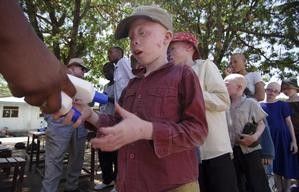Attackers Hack Off Seven-Year-Old Albino Boy's Arm in Tanzania
A seven-year-old boy's arm has been hacked off by men in Tanzania, for the purposes of witchcraft.
The boy, Mwigulu Magessa, was walking back from school with his friends when three unidentified men attacked him. A local politician, Apolinary Macheta, confirmed the reports and added that the boy was recovering from the attack in the hospital.
The maiming of Mwigulu is the latest in a series of brutal attacks on albinos in Africa and particularly in Tanzania. There is a widespread belief that charms made from their body parts act as signs of good fortune and prosperity.

Earlier incidences of this sort include a horrific account of a mother of four children being attacked by men with machetes; she too lost her arm. Police have since confirmed they have arrested five men connected to the incident and have recovered the arm, which was buried in a nearby field.
Last month, an albino child died after a similar attack with a machete.
The bloody practice of hunting albinos for their body parts is becoming increasingly common in East Africa, where their limbs can fetch thousands of dollars on the black market. And in a country where, according to World Bank data, Gross National Income (per capita) is $540 (approximately £350) the fact such limbs can fetch up to $2,000 is a major problem.
Furthermore, some in Tanzania link albinism with a curse afflicting the family. Some also link them with ghosts. In a country still plagued by centuries-old superstition, albinos in Tanzania have to live in constant fear of being attacked and treated like walking meat freezers.
A 2008 BBC report highlighted remote rural areas, such as the Mwanza region on the shores of Lake Victoria as particular hotbeds of this kind of activity and also said witch doctors were responsible for furthering the belief that potions made from an albino's legs, hair, hands and/or blood could make a person rich.
Police in the capital of Dar es Salaam have repeatedly stated the murders are the work of organised gangs. The Tanzanian government has taken some steps to curb these atrocities, including the mandatory award of a death penalty to those convicted.
An estimated 200,000 albinos live in Tanzania, although fewer than 8,000 have registered officially. An International Federation of the Red Cross report said albinos faced "a silent emergency" and that their killings had triggered a "small scale humanitarian crisis" as albinos fled their homes to hide from potential killers.
© Copyright IBTimes 2025. All rights reserved.





















